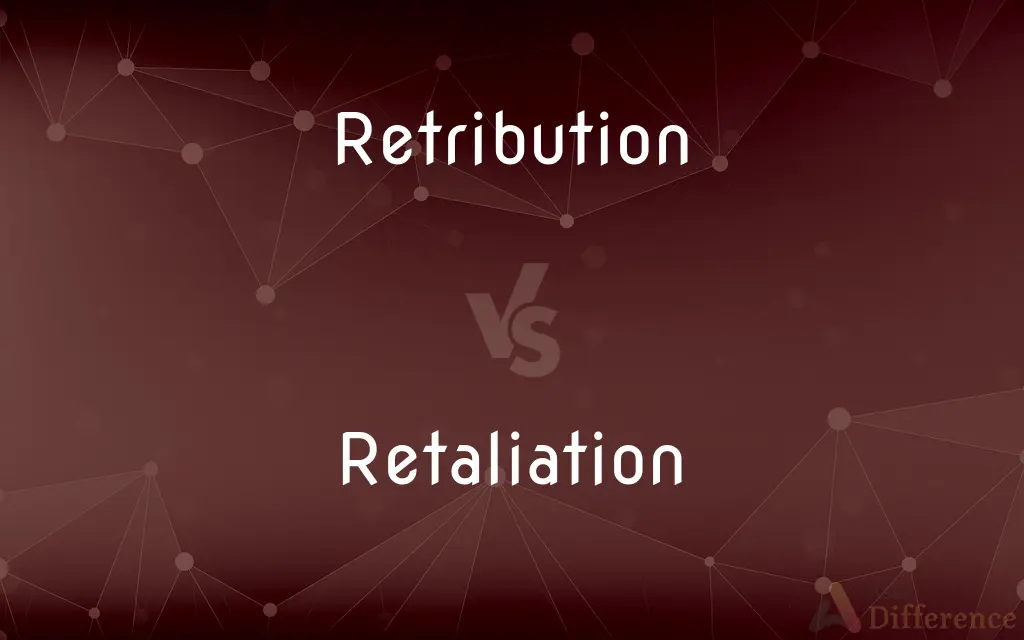Retribution vs. Retaliation — What's the Difference?
By Urooj Arif & Fiza Rafique — Updated on April 5, 2024
Retribution emphasizes justice or punishment fitting the crime, focusing on moral or legal balance. Retaliation is about responding to harm or offense, often driven by personal vendetta or emotion.

Difference Between Retribution and Retaliation
Table of Contents
ADVERTISEMENT
Key Differences
Retribution is fundamentally concerned with the principles of justice and morality, aiming to restore balance through punishment that is proportionate to the offense. It often involves a formal process, ensuring the punishment fits the crime. On the other hand, retaliation is primarily a reaction to a perceived wrong, focusing on responding to an injury or insult, regardless of proportionality. It is more about the act of responding than restoring moral or legal balance.
In the context of law, retribution is a judicially sanctioned act, where the legal system determines the punishment based on the severity of the offense. This ensures that the punishment is impartial and appropriate. Whereas retaliation often occurs outside the legal system, driven by personal feelings or the desire for revenge, and lacks the impartiality that comes with judicial proceedings.
Retribution serves a societal function by deterring future offenses and reaffirming societal norms about right and wrong. It reflects a collective agreement on the consequences of certain actions. Retaliation, however, can escalate conflicts and perpetuate cycles of violence, as it is based on personal vengeance rather than societal norms.
The philosophical underpinnings of retribution are rooted in concepts of fairness and justice, where the goal is to achieve a moral equilibrium. Retaliation is less about fairness and more about personal satisfaction or emotional response to being wronged, which can lead to disproportionate responses.
Retribution requires evidence, due process, and a legal framework to adjudicate and enforce punishment. Retaliation may be immediate and driven by impulse, without the same requirements for evidence or proportionality, often leading to further harm or injustice.
ADVERTISEMENT
Comparison Chart
Basis
Justice and morality
Personal vendetta or emotion
Process
Formal and judicial
Often informal and personal
Purpose
Restore balance and deter future offenses
Respond to harm or offense
Guiding Principles
Proportionality and fairness
Personal satisfaction or emotional response
Outcome
Aims for societal reaffirmation of norms
Can escalate conflicts or perpetuate violence
Compare with Definitions
Retribution
Punishment inflicted on someone as vengeance for a wrong or criminal act.
The judge's sentence aimed to provide retribution for the heinous crime.
Retaliation
The act of returning an attack; counterattack.
The group's sudden retaliation surprised their opponents.
Retribution
The act of punishing or taking vengeance for wrongdoing or injury.
In classical literature, retribution often follows the protagonist's moral transgressions.
Retaliation
Revenge or reprisal for an injury or offense.
He considered his actions to be just retaliation for the insult.
Retribution
Justice based on retaliation or punishment.
The concept of retribution is central to many legal systems around the world.
Retaliation
Taking action against someone for a perceived wrong.
Her decision to retaliate was swift and decisive.
Retribution
A form of penalty intended as a morally correct response to an offense.
The community sought retribution against the corrupt official through legal means.
Retaliation
Responding to harm with harm.
The cycle of retaliation between the two factions led to increased hostilities.
Retribution
The enforcement of penalties for offenses in the interest of fairness.
The victim's family felt that the sentence delivered was just retribution.
Retaliation
A defensive or revengeful response to provocation.
The government's retaliation against the rebels was immediate.
Retribution
Punishment administered in return for a wrong committed.
Retaliation
To do something in response to an action done to oneself or an associate, especially to attack or injure someone as a response to a hurtful action.
Retribution
(Theology) Punishment or reward distributed in a future life based on performance in this one.
Retaliation
To pay back (an injury) in kind.
Retribution
Punishment inflicted in the spirit of moral outrage or personal vengeance.
Retaliation
Violent or otherwise punitive response to an act of harm or perceived injustice; a hitting back; revenge.
Retribution
The act of retributing; repayment.
In good offices and due retributions, we may not be pinching and niggardly.
Retaliation
The act of retaliating, or of returning like for like; retribution; now, specifically, the return of evil for evil; e.g., an eye for an eye, a tooth for a tooth.
God . . . takes what is done to others as done to himself, and by promise obloges himself to full retaliation.
Retribution
That which is given in repayment or compensation; return suitable to the merits or deserts of, as an action; commonly, condign punishment for evil or wrong.
All who have their reward on earth, . . . Naught seeking but the praise of men, here findFit retribution, empty as their deeds.
Retaliation
Action taken in return for an injury or offense
Retribution
Specifically, reward and punishment, as distributed at the general judgment.
It is a strong argument for a state of retribution hereafter, that in this world virtuous persons are very often unfortunate, and vicious persons prosperous.
Retribution
A justly deserved penalty
Retribution
The act of correcting for your wrongdoing
Retribution
The act of taking revenge (harming someone in retaliation for something harmful that they have done) especially in the next life;
Vengeance is mine; I will repay, saith the Lord
For vengeance I would do nothing. This nation is too great to look for mere revenge
He swore vengeance on the man who betrayed him
The swiftness of divine retribution
Common Curiosities
How does retaliation differ from retribution in motivation?
Retaliation is driven by personal vendetta or emotional response, unlike retribution which seeks justice.
Can retribution be considered fair?
Yes, it aims for fairness by ensuring punishment is proportionate to the crime.
How does society view retribution?
As a necessary component of the justice system to deter future offenses and uphold norms.
Is retaliation always immediate?
While often immediate, some forms of retaliation can be planned over time.
Is retaliation always illegal?
Not always, but it often bypasses formal legal processes and can lead to unlawful actions.
Can retribution deter crime?
Yes, by demonstrating societal consequences for certain actions.
What role does evidence play in retribution?
Crucial, as it determines the severity of punishment through a legal framework.
What drives an individual to retaliate?
Personal feelings of anger, hurt, or the desire for revenge after being wronged.
How do legal systems ensure retribution is fair?
Through due process, evidence evaluation, and proportionality in sentencing.
What is the main goal of retribution?
To restore moral and legal balance through proportionate punishment.
Why might retaliation lead to more conflict?
It can escalate violence or conflict due to its personal and often disproportionate nature.
Can retribution provide closure?
It can, by affirming that justice has been served according to societal standards.
Can retaliation be justified?
In personal viewpoints, yes, but it may not align with legal or moral standards.
Why might some prefer retaliation to legal action?
For immediate satisfaction or if they distrust the legal process.
What can be the consequences of unchecked retaliation?
It can lead to ongoing cycles of violence and further societal harm.
Share Your Discovery

Previous Comparison
Duct vs. Pipe
Next Comparison
Tab vs. TagAuthor Spotlight
Written by
Urooj ArifUrooj is a skilled content writer at Ask Difference, known for her exceptional ability to simplify complex topics into engaging and informative content. With a passion for research and a flair for clear, concise writing, she consistently delivers articles that resonate with our diverse audience.
Co-written by
Fiza RafiqueFiza Rafique is a skilled content writer at AskDifference.com, where she meticulously refines and enhances written pieces. Drawing from her vast editorial expertise, Fiza ensures clarity, accuracy, and precision in every article. Passionate about language, she continually seeks to elevate the quality of content for readers worldwide.














































